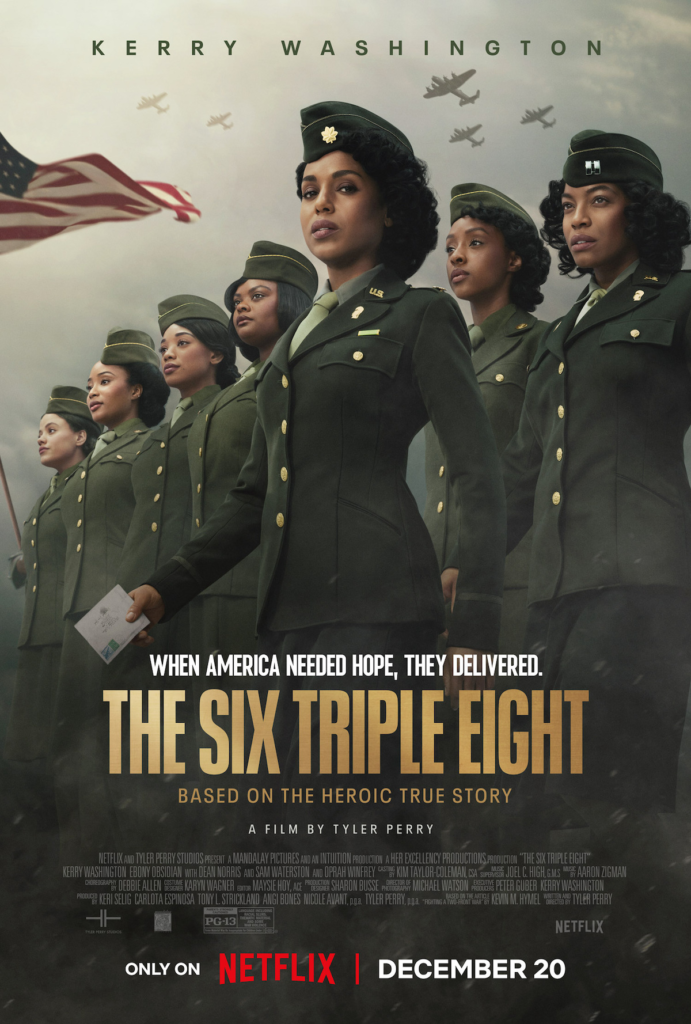The Six Triple Eight Christian Review

It’s not every day that a film like The Six Triple Eight comes along—a movie with a story so ripe for the telling that you almost feel it’s been waiting for someone to bring it to the screen. Tyler Perry steps up to that challenge here, tackling the incredible, little-known tale of the 6888th Central Postal Directory Battalion, a group of African American women who, during World War II, handled the Herculean task of clearing a backlog of mail destined for soldiers. It’s a story of resilience, grit, and quiet triumph. But does Perry’s film rise to meet the moment? As a Christian, my answer is complicated.
Let’s be clear: the subject of this film is extraordinary. These women, largely forgotten by history, embodied a servant-hearted determination that feels almost Biblical. Their task may not have been glamorous—sorting mail rarely is—but it was vital, a lifeline for soldiers on the frontlines. Yet, while the story itself is a gift, the way Perry tells it sometimes feels like it leaves that gift unopened, struggling to go beyond the surface.
Honoring the Legacy
In many ways, this is a deeply Christian story. You can see echoes of the Apostle Paul’s words in 1 Corinthians 12 about the body of Christ and how every part, even those considered “less honorable,” is indispensable. The women of the 6888th weren’t commanding troops or designing battle strategies. They were sorting letters, connecting hearts across oceans. And yet, without them, morale would have crumbled.
This is where Perry gets it right. He gives us a glimpse of their struggle against racism, sexism, and systemic neglect. These women weren’t just overlooked; they were actively doubted, their mission seen as unimportant. Watching them rise above all of that feels like witnessing a small piece of redemption—proof that quiet faithfulness can change the world.
But then, there’s the execution. For all the story’s beauty, Perry doesn’t quite trust his audience to grasp its weight. He spells it out, often literally, in the form of title cards and narration that reiterate points already made. The final moments of the film, which feature archival footage and a long list of the women’s achievements, feel like a well-meaning lecture. It’s as if Perry is afraid we won’t “get it” unless he holds our hand the entire way.
The Struggle to Connect
Here’s the thing about The Six Triple Eight: it’s informative, but it rarely feels transformative. As a Christian, I find that disappointing because this story has all the makings of something that could inspire deep, personal reflection. These women weren’t just soldiers; they were image-bearers of God (Genesis 1:27), serving in ways that were hidden but deeply impactful.
And yet, the film keeps us at arm’s length. We see their hardships and their victories, but we don’t really know them. What drove them? What sustained them in the face of constant adversity? Faith? Hope? Sheer determination? Perry doesn’t spend enough time exploring these inner lives, and that’s a shame. Imagine the depth the story could have had if it delved into the spiritual or emotional underpinnings of their resilience.
Instead, the narrative feels like it’s ticking boxes. Yes, we get a sense of the racism and sexism they endured, but it’s presented in a way that feels almost obligatory, rather than deeply felt. And when the film finally shifts to their accomplishments—the mail they sorted, the lives they touched—it doesn’t linger long enough to let us truly appreciate the scale of what they achieved.
The Balance of Suffering and Triumph
One of the film’s biggest struggles is its focus. While it’s crucial to acknowledge the hardships these women faced, the story leans so heavily into their suffering that their triumphs feel almost like an afterthought. As a viewer, you’re left wanting more celebration, more joy.
From a Christian perspective, this imbalance is especially noticeable. Scripture often ties suffering to glory (Romans 8:18), but it never stops at the suffering. The point is always the redemption that comes after. These women didn’t just endure; they conquered. They cleared an overwhelming backlog of mail in record time, boosted troop morale, and shattered stereotypes along the way. But the film doesn’t quite capture the fullness of that victory.
There’s a tension here, and it’s one the film never fully resolves. How do you honor the pain of their journey without letting it overshadow their achievements? Perry’s answer seems to be to err on the side of the former, but in doing so, he misses the opportunity to uplift and inspire in the way this story deserves.
An Educational Experience
If there’s one thing the film undeniably accomplishes, it’s educating its audience. Before watching, I had only a vague idea of the 6888th Battalion’s existence. Now, I understand their role and their impact. That’s no small thing.
But education alone isn’t enough. As Christians, we know that knowledge without transformation is hollow. The Six Triple Eight gives us the facts, but it doesn’t always translate them into something that stirs the heart or moves the spirit. It’s like reading a well-written textbook: informative, yes, but not necessarily life-changing.
The film could have been more. It could have asked us to reflect on how we treat those who serve in unseen roles or challenged us to honor the overlooked in our own lives. It could have been a call to action, urging us to fight for justice and recognition for those still marginalized today. Instead, it feels content to stay in the realm of history lesson, rather than diving into the deeper waters of meaning and impact.
Cultural and Spiritual Significance
That said, there’s undeniable value in bringing this story to the screen. As Christians, we’re called to remember the forgotten and honor the overlooked. Perry’s film does that, even if imperfectly.
There’s a moment in the film where you can almost feel the weight of history lifting, where you realize these women are finally getting their due. It’s powerful, even if the execution isn’t flawless. And it’s a reminder that justice, even when delayed, is worth pursuing.
In a culture that often celebrates only the loudest or the most visible, The Six Triple Eight shines a light on the quiet heroes. That alone makes it worth watching, even if it doesn’t leave you profoundly changed.
Final Thoughts
So, where does that leave us? The Six Triple Eight is a film with its heart in the right place. It tells a story that desperately needed to be told, and it does so with a genuine desire to honor its subjects. But it also stumbles, weighed down by heavy-handed storytelling and a reluctance to let the audience do the emotional heavy lifting.
For Christians, it’s a film that offers much to reflect on, even if it doesn’t fully explore its spiritual dimensions. It’s a reminder of the dignity of work, the value of perseverance, and the importance of honoring those who labor in the shadows.
Is it perfect? No. But it’s still worth your time, if only to remember the incredible women of the 6888th Battalion and the legacy they left behind.
Rating: 7/10
A flawed but earnest tribute to a remarkable group of women, with a story that deserves to be remembered even if the film itself isn’t unforgettable.






